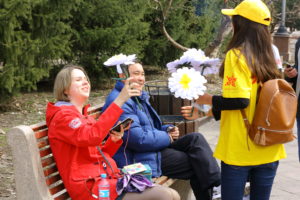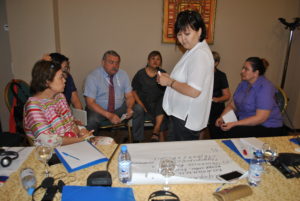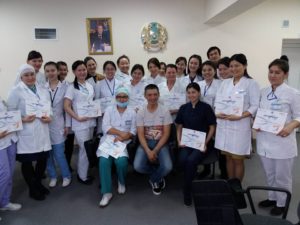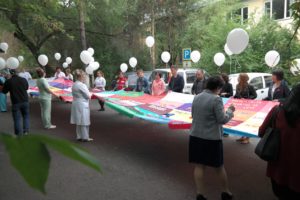 Kristina from Almaty, Kazakhstan was diagnosed with HIV when she was in prison. At first, the woman got scared because she did not know how to live with this diagnosis. Now the woman is the volunteer of the organisation ‘Doverie Plus.’ She advises girls on how to be adherent to the treatment, motivates to start the treatment, and conducts other various activities.
Kristina from Almaty, Kazakhstan was diagnosed with HIV when she was in prison. At first, the woman got scared because she did not know how to live with this diagnosis. Now the woman is the volunteer of the organisation ‘Doverie Plus.’ She advises girls on how to be adherent to the treatment, motivates to start the treatment, and conducts other various activities.
“My life was pretty hard until I met Alla and Roza from the fund ‘Doverie Plus.’ They explained me a lot and supported me. Before I met them, I did not know anything about antiretroviral therapy (ART) therapy, and how it affects HIV virus. They told me I had to take it, and I was taking it, but every day I took it in a different time, without knowing that I had to take it in the same time every day. Now I know that I have to have the regime with my medicine and I have to take it every day in the same time. I achieved a viral load of less than 500 copies. Before meeting Alla and Roza, I was often tired of my life. After our talks, I felt much better. I want to live, I am living, and I will be living,” Kristina says.
Public Fund ‘Doverie Plus’ is working within the project ‘Improved TB/HIV Prevention & Care – Building Models for the Future.’ The fourth year of the project is starting in October 2017. Launched three years ago, the project is aimed at establishing an effective partnership between public and non-public TB and HIV care providers in Almaty, Kazakhstan.
STOP TB partnership is established
 “The project is unique in terms of the community involvement, strengthening, increasing capacity of community based NGOs, and building strong inter-sectorial collaboration in Almaty. All big achievements are built from little efforts. The little effort was done to improve the access to services for key populations on the city level and we succeeded,” the Executive Director of Public Foundation “AIDS Foundation East-West in Kazakhstan” Roman Dudnik is sharing. “We have a strong NGO Network, and it is linking with all existent service providers. In the end, all people in need have the possibility to get services related to HIV and TB. We plan to develop this approach further, and we want to increase the capacity and knowledge level of all stakeholders, including NGOs, state and private medical clinics. This project should become the best practice model for other cities of Kazakhstan and our neighboring countries.”
“The project is unique in terms of the community involvement, strengthening, increasing capacity of community based NGOs, and building strong inter-sectorial collaboration in Almaty. All big achievements are built from little efforts. The little effort was done to improve the access to services for key populations on the city level and we succeeded,” the Executive Director of Public Foundation “AIDS Foundation East-West in Kazakhstan” Roman Dudnik is sharing. “We have a strong NGO Network, and it is linking with all existent service providers. In the end, all people in need have the possibility to get services related to HIV and TB. We plan to develop this approach further, and we want to increase the capacity and knowledge level of all stakeholders, including NGOs, state and private medical clinics. This project should become the best practice model for other cities of Kazakhstan and our neighboring countries.”
The project ‘Improved TB/HIV Prevention & Care – Building Models for the Future’ is aimed at increasing government recognition of the role and quality of the non-public sector for TB/HIV service delivery, providing TB/HIV services according to agreed standards, encouraging civil society to be the active participant in monitoring quality of services, ensuring that clients have affordable options and trust in service provision, stronger linkages between government, project and civil society.
 “During three years of our work, we achieved understanding of the integrated TB/HIV care model among key stakeholders and gained strong political commitment and support from healthcare department of Almaty through establishment of the platform for partners’ dialogue,” a project manager of AFEW Kazakhstan Kristina Zhorayeva is saying. “We also established STOP TB partnership for the effective coordination and collaboration between all partners working in TB and HIV areas. Private clinics are now integrated with TB and project services, and thus the number of private clinics that are eligible to provide tuberculosis care is increasing. Besides, healthcare authorities of Almaty recognized the importance of project interventions directed to strengthening the role of local NGOs in provision of TB and HIV care. With their understanding, we have created the working group on HIV and TB.”
“During three years of our work, we achieved understanding of the integrated TB/HIV care model among key stakeholders and gained strong political commitment and support from healthcare department of Almaty through establishment of the platform for partners’ dialogue,” a project manager of AFEW Kazakhstan Kristina Zhorayeva is saying. “We also established STOP TB partnership for the effective coordination and collaboration between all partners working in TB and HIV areas. Private clinics are now integrated with TB and project services, and thus the number of private clinics that are eligible to provide tuberculosis care is increasing. Besides, healthcare authorities of Almaty recognized the importance of project interventions directed to strengthening the role of local NGOs in provision of TB and HIV care. With their understanding, we have created the working group on HIV and TB.”
Created first NGO in the city for TB patients
One of the biggest achievements of the project is the creation of community based NGO. It is the first NGO in Almaty city aiming its activity on TB patients and their environment. Their start up showed successful work on self-support group and client management for TB patients. The Public Foundation ‘Sanat Alemi’ has the following activities: social mobilization, advocacy, communication of people affected by tuberculosis, TB/HIV, AIDS and other socially significant diseases, reducing stigma, discrimination and develop commitment to effective prevention methods, diagnostic, drug management and treatment.
 The founders of ‘Sanat Alemi’ are people who were successfully cured of multi-drug-resistant tuberculosis and extensively drug-resistant TB. In addition, one of the founders is an independent expert on TB, has extensive experience in treatment, drug supply, monitoring and organization of TB-based activities nationally.
The founders of ‘Sanat Alemi’ are people who were successfully cured of multi-drug-resistant tuberculosis and extensively drug-resistant TB. In addition, one of the founders is an independent expert on TB, has extensive experience in treatment, drug supply, monitoring and organization of TB-based activities nationally.
“The social support for tuberculosis patients plays a key role in increasing adherence to the treatment. The success in treatment is possible with the combination of trust, human relationships and the support of professionals, such as a psychologist and social worker,” the director of public foundation Sanat Alemi Roza Idrisova is saying.
The project ‘Improved TB/HIV Prevention & Care – Building Models for the Future’ is implemented with the support from the Dutch Government (DGIS), KNCV and its partners, AFEW International, HIVOS and PharmAccess.



